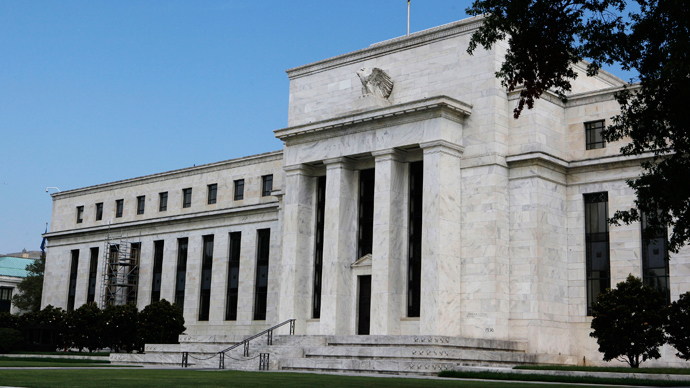US Fed's plan to end bond purchases drags markets down

Global markets tumbled after the US Federal Reserve Chairman Ben Bernanke said the US monetary regulator will begin tapering its aggressive $85 billion bond buying stimulus later this year.
Bernanke spoke Wednesday at a media conference after the two-day
policy meeting of the FOMC. He says the US economy is expanding
strongly enough for the Fed to consider pulling out of its
aggressive stimulus in 2013 and end the bond buying around
mid-2014 if economic data warrants it.
"The committee currently anticipates that it will be
appropriate to moderate the monthly pace of purchases later this
year, and if the subsequent data remain broadly aligned with our
current expectations for the economy, we will continue to reduce
the pace of purchases in measured steps through the first half of
next year, ending purchases around mid-year," Bernanke said.
Investors’ fears have come true, as the news sent stocks and
bonds sharply lower, pushing benchmark Treasury yields to a
15-month high, Reuters reports. The uncertainty on when exactly
the Fed will start scaling back the stimulus still looms.
The US central bankers believe that moderate growth will bring
further improvement to the labour market. The number of
unemployed people in the US is expected to slip to 7 percent from
the current 7.6 percent by the time the Fed ends bond buying. The
Fed expects the unemployment rate in 2013, 2014, and 2015 to be
lower than previously forecast. Bernanke added that in case the
optimistic forecasts do not come true, the Central Bank could
resume bond purchases.
Ben Bernanke also said the Fed expects inflation to climb towards
the 2 percent target mark. The US central bank’s forecast for
2013 GDP growth was updated to a slightly lower reading, however
the outlook for 2014 was upgraded.
"The committee sees the downside risks to the outlook for the
economy and the labor market as having diminished since the
fall," FOMC said.
In fact not much new was said on Wednesday since the FOMC last
released the minutes of its previous meeting in May. Then
Bernanke spoke of the possibility of pulling out of the huge bond
buying if the labor market shows “substantial improvement.”
However there has been no “substantial improvement” yet, says
David Williams, director at Strategic Gold Corporation who spoke
to IBTimes TV.
“They are not going to change anything because it hasn’t
improved substantially, so that’s just giving us more time, at
least until the end of the year even not after that,” he
said. “I think things will stay generally the same.”
According to a Reuters poll of 17 top Wall Street bond dealers,
16 of them expect the scaling back the bond purchases will begin
with September’s FOMC meeting.
Stocks, bonds and commodity markets in Europe and Asia sold off
sharply on the news from the Fed.
Gold tumbled to a 2 and a half year low also reacting to the news
from the US. Bullion prices fell below $1,300 an ounce in London,
exceeding April’s drop into a bear market, Bloomberg says. In
2013 the precious metal has already lost 22 percent, as investors
sold off gold becoming less confident in it as a hedge from
inflation. This year’s drop may well become the biggest annual
decline in more than three decades.
Silver also slid significantly, diving to the lowest price since
2010.












